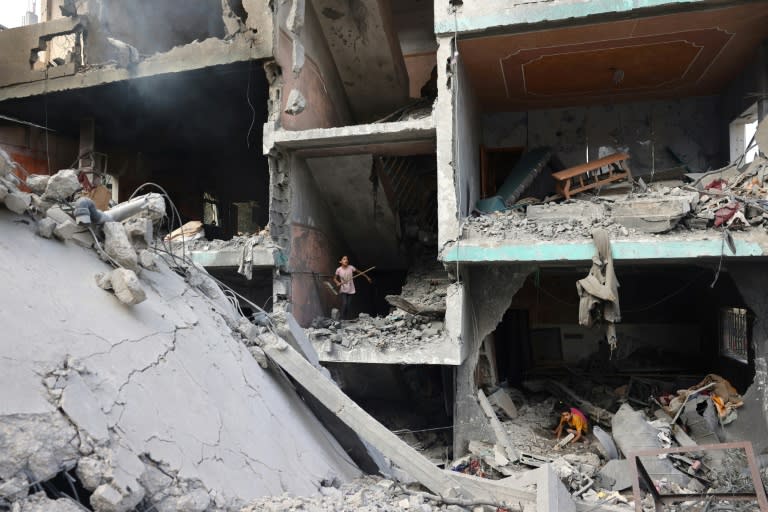Blinken in Israel to push Gaza ceasefire plan backed by UN

US Secretary of State Antony Blinken held talks in Israel with Prime Minister Benjamin Netanyahu on Monday, pushing a ceasefire plan that the UN Security Council later supported in an effort to halt eight months of war in the Gaza Strip.
Blinken met for around two hours in Jerusalem with Netanyahu and discussed diplomacy towards a ceasefire, US officials said, before the Security Council adopted a US-drafted resolution supporting the ceasefire plan.
The text, passed with 14 votes in favour and Russia abstaining, "welcomes" the truce and hostage release proposal announced on May 31 by President Joe Biden and urges "parties to fully implement its terms without delay and without condition".
Blinken is on his eighth visit to the region since the war began on October 7 with Hamas's unprecedented attack on Israel.
Netanyahu has been politically buoyed in Israel by a rescue mission that succeeded in freeing four hostages on Saturday -- but which was deadly and destructive for Palestinians.
A day later, though, Netanyahu received his first major political blow of the conflict when Benny Gantz and a second member of the war cabinet quit.
Gantz, a former army chief, criticised Netanyahu for failing to outline a post-war governance plan for Gaza, and said the prime minister "is preventing us" from a "real victory".
Witnesses in north and central Gaza reported helicopter gunfire and naval shelling hitting Gaza City, and air strikes on Deir al-Balah during the latest fighting.
Street battles raged in the southern areas of Rafah and Khan Yunis, where bodies were seen lying in the streets and Palestinian civilians were fleeing, an AFP correspondent said.
- Lying among the dead -
Outside the European Hospital in Khan Yunis, a grief-stricken man lay down among white-shrouded bodies to hug one of them after they were loaded onto a truck. Other men had to pull him from the body bag.
The latest clashes follow major combat and heavy air strikes during Saturday's hostage rescue mission in central Gaza's Nuseirat refugee camp.
While Israelis celebrated the return of the four captives in good physical health, Palestinians condemned a toll that health officials in the Hamas-ruled territory said killed 274 people and wounded almost 700, many of them women and children.
"The images of death and devastation following Israel's military operation there prove that each day this war continues, it only grows more horrific," a UN report late Monday quoted Martin Griffiths, the world body's humanitarian chief, as saying.
Hamas's October attack, which began the bloodiest-ever Gaza war, resulted in the deaths of 1,194 people, mostly civilians, according to an AFP tally based on Israeli official figures.
The militants also seized 251 hostages, more than 100 of whom were released during a November truce. After Saturday's rescue mission, 116 hostages remain in Gaza, though the army says 41 of them are dead, including Yoram Metzger, 80.
His wife Tami Metzger blames her own government for his death.
"If the government had stopped the war" he would still be alive, said Metzger, whose husband remained in Gaza after her own release from captivity in November.
Orit Meir, the mother of Almog Meir Jan, who was rescued on Sunday, expressed gratitude to troops for freeing him but said: "The remaining hostages need a deal to get home safely."
Despite months of shuttle diplomacy, mediators have failed to broker a new deal since the week-long ceasefire in November that also saw Palestinians released from Israeli detention.
Israel's retaliatory military offensive has killed at least 37,124 people in Gaza, also mostly civilians, according to Gaza's health ministry.
The toll includes at least 40 deaths over the past 24 hours, the ministry said Monday.
The war has brought widespread devastation to Gaza. Most of its 2.4 million inhabitants are displaced, and United Nations agencies warn that many are on the brink of starvation.
- Renewed push -
US President Joe Biden made a renewed push to halt the fighting when he presented what he called an Israeli truce proposal on May 31 and urged Hamas to agree to it.
Biden had earlier suspended a shipment of weapons to Israel and accused Netanyahu of prolonging the war to stay in power, an assertion he later backtracked on.
Talks resumed soon after between US, Egyptian and Qatari mediators, but without achieving a breakthrough so far.
Hamas officials have insisted any agreement must guarantee a permanent end to the war, a demand Israel has firmly rejected, vowing to destroy Hamas and free the remaining captives.
The US-drafted text of the Security Council resolution said a first phase would see an "immediate, full and complete ceasefire", the release of hostages in exchange for Palestinian prisoners in Israeli jails, and the "withdrawal of Israeli forces from the populated areas in Gaza".
This would also allow the "safe and effective distribution of humanitarian assistance at scale throughout the Gaza Strip to all Palestinian civilians who need it", according to the draft seen by AFP.
The United States has previously blocked a number of ceasefire resolutions before the Council.
Hamas said it "welcomes" the Security Council vote that adopted the resolution.
- Gantz meeting -
Blinken arrived in Israel after closed-door talks in Cairo with Egyptian President Abdel Fattah al-Sisi.
Blinken told reporters in Cairo that his message to regional governments was that "if you want a ceasefire, press Hamas to say yes" to the proposal.
He later told Netanyahu that it would "unlock the possibility of calm along Israel's northern border and further integration with countries in the region", State Department spokesman Matthew Miller said.
Israeli forces and Iran-backed Hezbollah fighters in Lebanon have exchanged regular cross-border fire during Gaza's war.
Blinken also indicated that he would meet Gantz in Israel but played down the significance.
Blinken is also expected to stop in Jordan and Qatar.
burs-jd/fz/it/js


